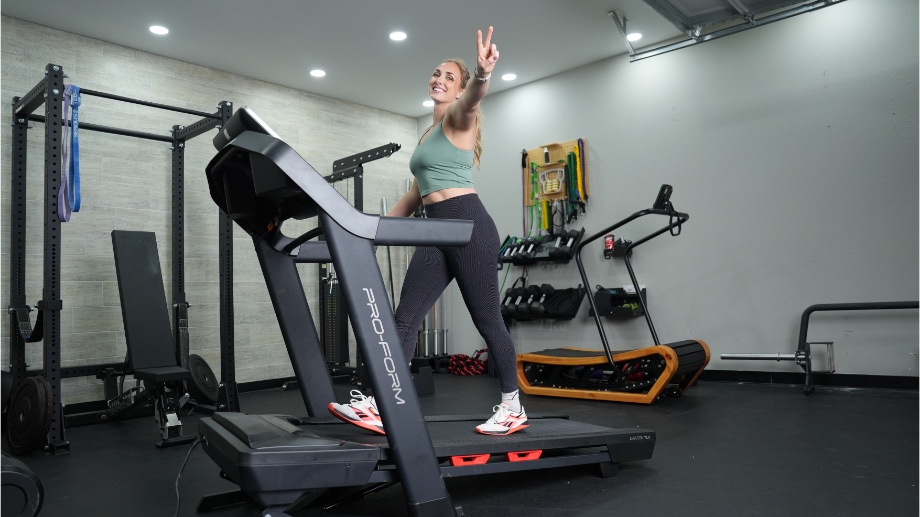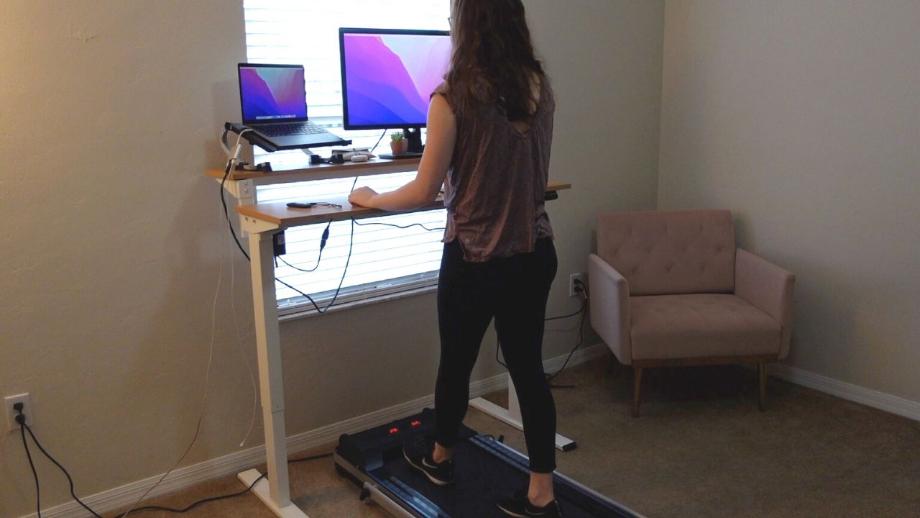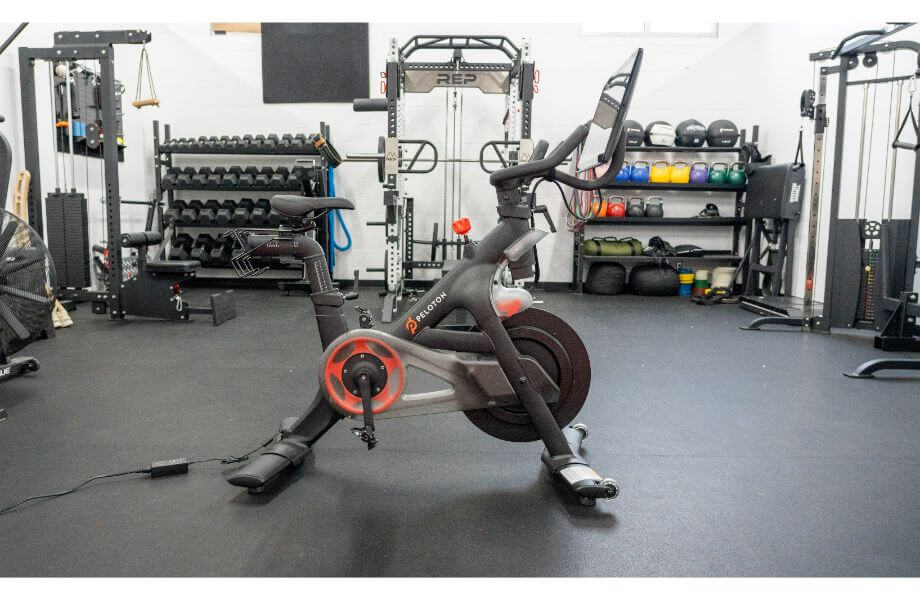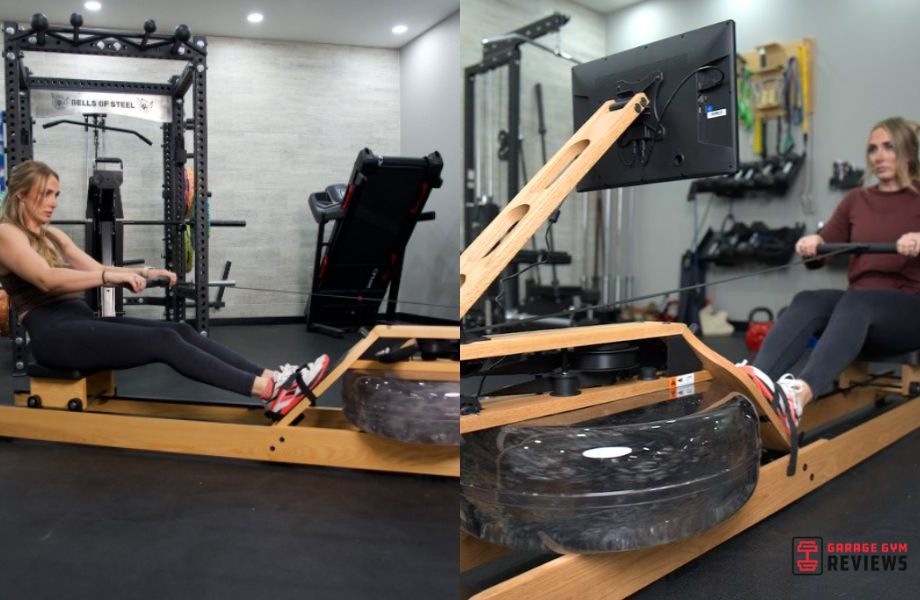You may think you have to push yourself to the max to get an effective workout, but something as simple as walking can have a ton of health benefits without putting too much stress on your body. While any form of walking has its perks, treadmills, in particular, may help make a difference in your overall wellness. Proper walking technique is also much easier to master than hill sprinting, for example.
Here, we’ll discuss the benefits of walking on a treadmill, plus answer some of the most commonly asked questions about this low-impact cardio exercise.
What Are the Benefits of Walking on a Treadmill?
There are so many benefits of walking on a treadmill. Here are some of the most extensively researched.
1. May Improve Cardiovascular Health
While walking is low-impact, it’s still a form of cardio, which means it’s good for your heart. Specifically, walking can improve many risk factors associated with heart disease. One meta-analysis showed that walking could help1:
- Increase aerobic activity
- Reduce blood pressure (both systolic and diastolic)
- Decrease weight and waist circumference
- Reduce body fat percentages and body mass index (BMI)
According to research, the number of steps you take per day2 is more important than the intensity of those steps. While 10,000 is often thought of as the gold standard, aiming for a daily step count of around 8,000—when compared to 4,000—may help reduce all-cause mortality3, including from heart disease.
RELATED: Is Walking the Best Cardio?
2. Can Assist With Weight Loss
Aerobic exercises like walking can help promote weight loss even when done independently (i.e., not combined with dietary changes). In one study, participants who added walking to their routine (five days a week for 10 months) without changing their diets lost an average of 8.5 to 11.4 pounds4.
One thing to note is that participants burned 400 to 600 calories during these walking sessions, which translates to about 1.5 to 2.25 hours at a moderate pace of 3.5 MPH, according to estimates from Harvard Health5.
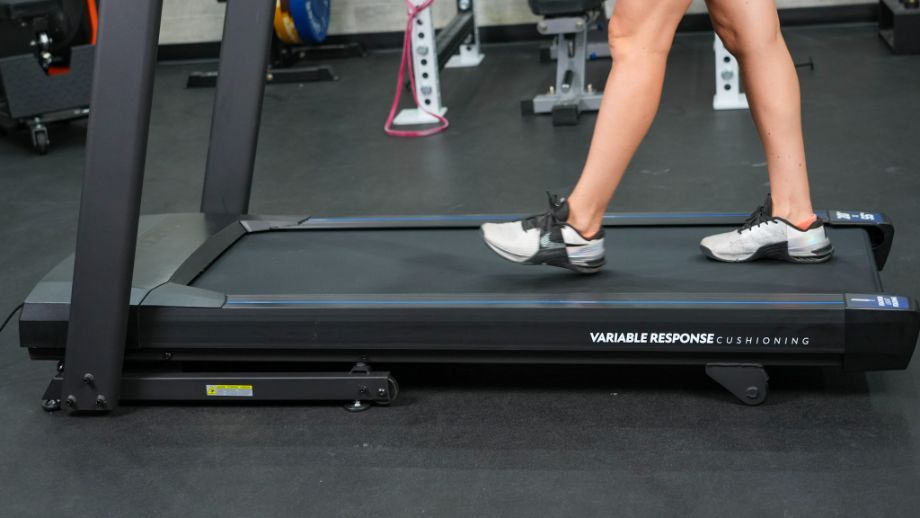
And again, intensity isn’t a major determining factor. Even walking at low speeds can help promote weight loss. One study actually found that slow walking has a greater effect on weight loss6 than speed walking (at least in the first few months) in overweight subjects.
RELATED: Treadmill Walking Workout For Weight Loss
This doesn’t mean you should phone it in and only do the bare minimum—getting your heart rate up has many benefits. But if you’re new to walking, you can start slow and work your way up to faster speeds and longer session times as your body adjusts—no need to overexert yourself right out of the gate.
3. May Improve Bone Health
Regular exercise has been shown to improve bone mineral density7 (BMD) and help combat osteopenia and osteoporosis—two bone diseases related to aging.
In one study, treadmill walking helped increase BMD in the lumbar spine (lower back) of obese, asthmatic individuals8 while reducing inflammation and decreasing other health markers, like cholesterol and triglycerides.
Another study looked at peri- and postmenopausal women (the group at the highest risk of osteoporosis) and found that while walking may not increase bone mineral density in all bones, it can have a positive effect on your neck/upper spine9.
4. May Improve Lower-Body Strength and Mobility
In addition to losing bone mass as you age, you also lose skeletal muscle—aka sarcopenia. One way to combat this is by making walking a regular part of your exercise routine.
Walking doesn’t strengthen your muscles in the same way that strength training does, but it can improve lower limb strength10, especially when walking downhill.
Walking mainly works your lower body but can also engage different muscles like your core and arms (if you get them swinging). A benefit to walking on a treadmill is that you can easily change up your routine to target different leg muscle groups. For example, if you want to work your glutes more, you can set the treadmill on an incline or do hill intervals to strengthen your quadriceps and hamstrings.
RELATED: Incline Treadmill Benefits
Keep in mind that resistance training is still superior for preventing muscle loss, so it’s best to combine aerobic activity with weight lifting11.
5. Potential Mental Health Benefits
While there are many physical benefits, walking on a treadmill may offer some mental health benefits as well.
In a cross-sectional study, researchers compared the number of self-reported bad mental health days between people who exercised and those who didn’t. (They tried to match up everything else, like age, race, gender, marital status, income, education level, and self-reported physical health to remove any other variables). They found that those who exercised had about 43% fewer days of poor mental health in a month12.
More specifically, a 2023 study looked at how walking on a treadmill could affect mental health in women with type 2 diabetes (anxiety and depression are higher in those with diabetes). They found that, after walking on a treadmill three times per week for 12 weeks, the exercise group had higher well-being scores13.
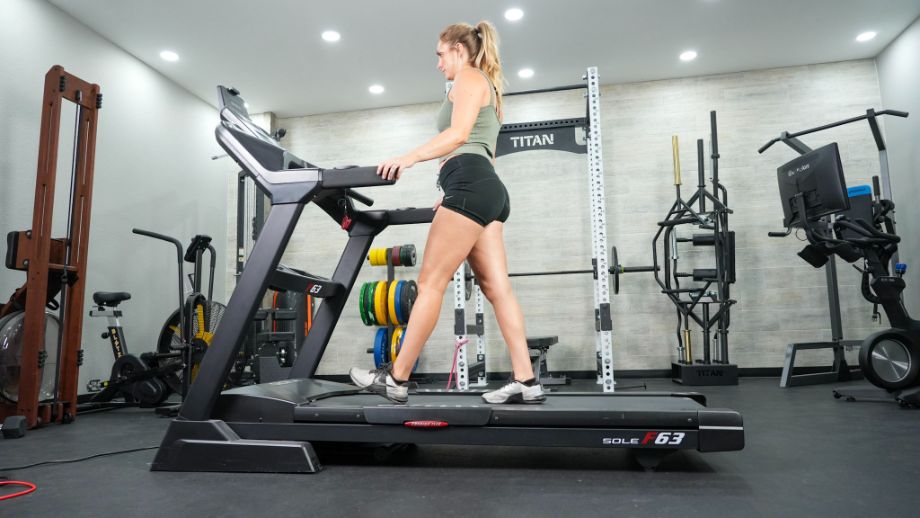
Exercise also reduces the stress hormones cortisol and adrenaline14 while stimulating the production of endorphins—neurochemicals that improve mood and reduce pain.
6. May Boost Brain Power
Physical activity is also connected to a healthier brain. According to the National Institute on Aging15, exercise boosts the production of a protein called FNDC5.
This protein activates neuroprotective genes in the hippocampus, the part of the brain responsible for memories. Because of this, walking may improve cognitive function, especially during aging, and can protect against cognitive decline and the development of memory-related brain disorders, such as Alzheimer’s disease.
Another study suggests that aerobic walking may help improve total and delayed memory recall in older women16.
7. Potential to Aid Digestion
You may have heard that an after-dinner walk can help with digestion—and it’s true. Research shows that brisk walking for 30 minutes after your meal can improve glycemic response17, even when the meal contains varying amounts of carbohydrates.
According to a meta-analysis published in 2022, breaking up bouts of sitting with light-intensity walks can help reduce postprandial glucose and insulin18. This not only connects to your digestion, but it also has cardiometabolic benefits—contributing to fat-burning and overall health (unmanaged blood sugar is one of the risk factors for heart disease).
Some research suggests that regular walking exercise can also improve constipation and associated symptoms19, such as bloat20. While conclusive statements can’t be made just yet, making walking a part of your daily routine certainly doesn’t hurt.
RELATED: Best Greens Powder For Bloating
8. May Improve Sleep
While many people reach for melatonin or other sleep aids, walking may be a better answer. Studies show that regular exercise can improve sleep quality21 with no adverse side effects.
In more targeted studies, researchers found that when compared to yoga, walking improved sleep more significantly in cancer patients22. And in the older population, the frequency and duration of walking sessions have been directly connected to sleep quality23.
9. Customized Workouts
Treadmill walking has its own unique benefits too. For starters, you can completely customize your workout instead of being limited to the terrain around your home. You can customize the settings, like incline, speed, and duration, ensuring you get the workout you want. And when you need a break or want to increase effort, you can do so on demand.
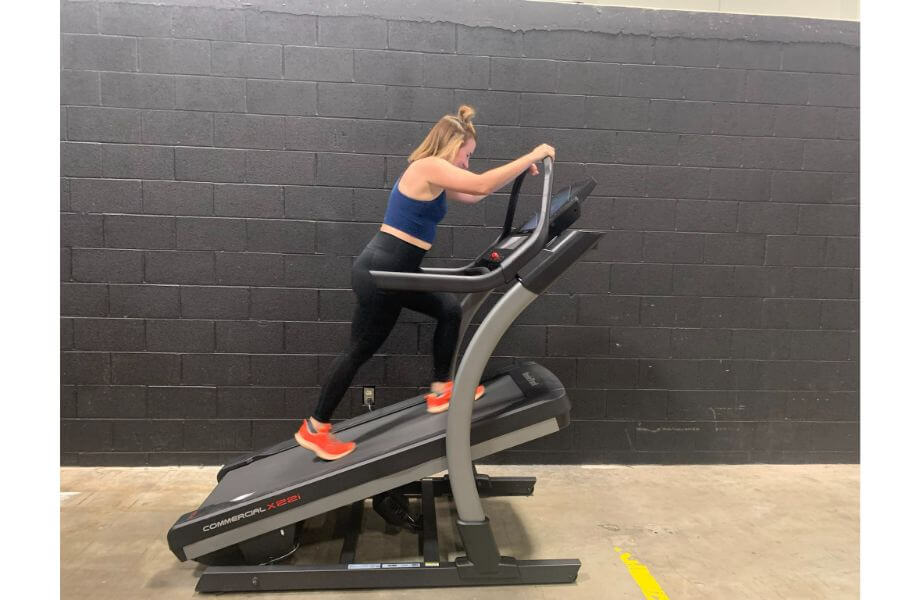
RELATED: Is Walking Backwards Good For You?
10. Convenience
A treadmill workout also offers convenience, especially if you have one in your home gym. You don’t have to commute to the gym or plan around the weather like you do when walking outside. You can safely work out at any time of the year and any time of day.
Treadmills also offer other convenience features, like handrails, fans, and water bottle holders, so they’re great for those who need a little extra support or people with health conditions that affect mobility. Additionally, the cushioning on a treadmill belt can absorb some of the impact from walking, so they’re easier on your joints than pavement or walking trails.
Another nod to convenience: If you work from home, you can grab a walking pad or an under-desk treadmill and get a walking workout in while you attend your fourth meeting of the day.
RELATED: Walking Pad Vs. Treadmill
Walking is also a really accessible form of exercise and works well for all fitness levels.
11. Some Treadmills Offer Entertainment
Many smart treadmills also offer entertainment via connected streaming services so you can walk while you catch up on your latest Netflix binge. Instead of parking it on the couch, you can get your daily steps in on one of the best treadmills with a TV screen. This can make exercise more appealing, especially at the end of a long day when you’d rather be doing anything else.
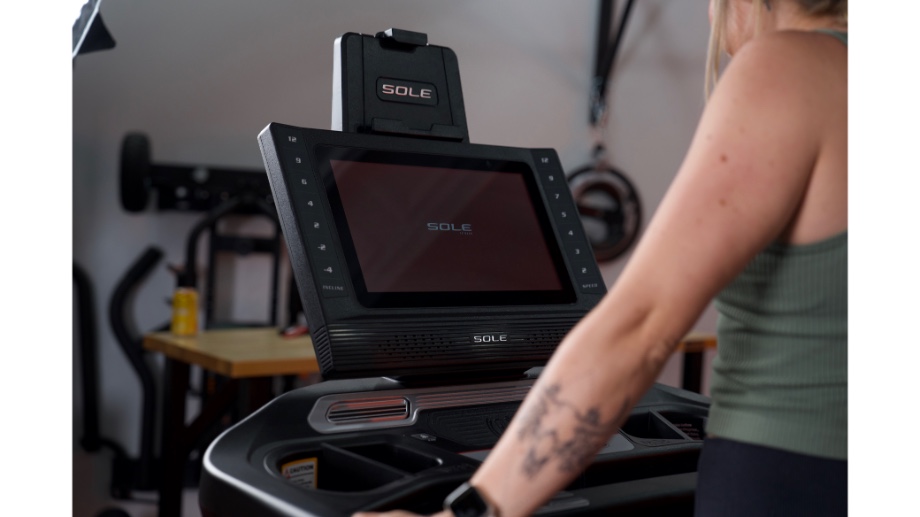
Benefits of Walking on a Treadmill: Final Thoughts
Walking is a simple exercise with a massive payoff. Walking on a treadmill can lower your risk of cardiovascular disease, help you lose weight, improve your brain and mental health, and strengthen your bones and muscles. It’s also convenient, since you’re not limited by weather or outdoor terrain. While you can certainly walk on a treadmill at your gym, it’s even more convenient if you have one at home.
Fortunately, they’re available at all different price points. If you need help picking one out, we’ve recommended our favorites in our best treadmills for walking roundup.
Benefits of Walking on a Treadmill: FAQs
How long should I walk on a treadmill to see results?
It depends on the results you want to see. For cardio benefits, the American Heart Association24 recommends 150 minutes of moderate to vigorous exercise per week, which could break down to 30 minutes five times per week. If you want to lose weight, you may need at least 35 minutes25.
Ideal duration also depends on the type of workout you’re doing. For example, high-intensity interval training, or HIIT-style workouts, burn more calories than low-intensity exercises, so you may be able to cut back on time. For more in-depth recommendations, check out our guide for how long to walk on a treadmill.
Is treadmill good for losing belly fat?
No exercise can directly target belly fat, but walking can help you lose it over time26. Walking can also increase adiponectin, a hormone that helps regulate glucose and break down fat. If you want to target visceral fat specifically—the deep type of fat inside your abdominal cavity—you may have to up the intensity27 of your workout.
What does walking on a treadmill do for your body?
There are a bunch of benefits of walking on a treadmill. It can improve heart health and reduce your risk of heart disease, help you lose body fat, and strengthen your bones. Walking also has mental health benefits and can improve sleep, which also affects weight28 and inflammation.
Is walking on the treadmill 30 minutes a day good?
Yes, walking for 30 minutes a day is great. The AHA recommends 150 minutes of moderate to vigorous activity per week, so 30 minutes a day for five days a week will hit that baseline.24
What is the best speed on a treadmill to lose weight?
A brisk walking speed of 3 to 4 MPH will help you burn more calories than a slower pace, so that’s likely a good target. That said, some studies have found that slow walking can help with weight loss, too. The bottom line: You want to pick a walking pace that feels like a good workout for you—not too leisurely, but not so fast that you can’t keep up.
References
1. Murtagh, EM, Nichols, L, Mohammed, MA, Holder, R, Nevill, AM, Murphy, MH. The effect of walking on risk factors for cardiovascular disease: an updated systematic review and meta-analysis of randomised control trials. Prev Med. 2015;72:34-43. doi:10.1016/j.ypmed.2014.12.041
2. National Institutes of Health. Number of steps per day more important than step intensity. Published March 31, 2020.
3. Saint-Maurice, PF, Troiano, RP, Bassett, DR Jr, et al. Association of Daily Step Count and Step Intensity With Mortality Among US Adults. JAMA. 2020;323(12):1151-1160. doi:10.1001/jama.2020.1382
4. Donnelly, JE, Honas, JJ, Smith, BK, et al. Aerobic exercise alone results in clinically significant weight loss for men and women: midwest exercise trial 2. Obesity (Silver Spring). 2013;21(3):E219-E228. doi:10.1002/oby.20145
5. Harvard Health Publishing. Calories burned in 30 minutes for people of three different weights. Published March 8, 2021.
6. La New, JM, Borer, KT. Effects of Walking Speed on Total and Regional Body Fat in Healthy Postmenopausal Women. Nutrients. 2022;14(3):627. doi:10.3390/nu14030627
7. Zhang, S, Huang, X, Zhao, X, et al. Effect of exercise on bone mineral density among patients with osteoporosis and osteopenia: A systematic review and network meta-analysis. J Clin Nurs. 2022;31(15-16):2100-2111. doi:10.1111/jocn.16101
8. Abd El-Kader, SM, Al-Jiffri, OH, Ashmawy, EM, Gaowgzeh, RA. Treadmill walking exercise modulates bone mineral status and inflammatory cytokines in obese asthmatic patients with long term intake of corticosteroids. Afr Health Sci. 2016;16(3):798-808. doi:10.4314/ahs.v16i3.21
9. Ma, D, Wu, L, He, Z. Effects of walking on the preservation of bone mineral density in perimenopausal and postmenopausal women: a systematic review and meta-analysis. Menopause. 2013;20(11):1216-1226. doi:10.1097/GME.0000000000000100
10. Rodio, A, Fattorini, L. Downhill walking to improve lower limb strength in healthy young adults. Eur J Sport Sci. 2014;14(8):806-812. doi:10.1080/17461391.2014.908958
11. Geng, Q, Zhai, H, Wang, L, Wei, H, Hou, S. The efficacy of different interventions in the treatment of sarcopenia in middle-aged and elderly people: A network meta-analysis. Medicine (Baltimore). 2023;102(27):e34254. doi:10.1097/MD.0000000000034254
12. Chekroud, SR, Gueorguieva, R, Zheutlin, AB, et al. Association between physical exercise and mental health in 1·2 million individuals in the USA between 2011 and 2015: a cross-sectional study. Lancet Psychiatry. 2018;5(9):739-746. doi:10.1016/S2215-0366(18)30227-X
13. Maharaj, SS, Nuhu, JM. Effect of treadmill walking for anxiety, depression, and social well-being in women with diabetes type 2: A randomized controlled trial. Health Care Women Int. 2023;44(6):734-752. doi:10.1080/07399332.2022.2090566
14. Harvard Health. Exercising to relax. Published July 7, 2020.
15. National Institute on Aging. Hormone links exercise with cognitive benefits. Published September 15, 2021.
16. Chou, CC, Chien, LY, Lin, MF, Wang, CJ, Liu, PY. Effects of Aerobic Walking on Memory, Subjective Cognitive Complaints, and Brain-Derived Neurotrophic Factor Among Older Hypertensive Women. Biol Res Nurs. 2022;24(4):484-492. doi:10.1177/10998004221098974
17. Bellini, A, Nicolò, A, Bazzucchi, I, Sacchetti, M. The Effects of Postprandial Walking on the Glucose Response after Meals with Different Characteristics. Nutrients. 2022;14(5):1080. doi:10.3390/nu14051080
18. Buffey, AJ, Herring, MP, Langley, CK, Donnelly, AE, Carson, BP. The Acute Effects of Interrupting Prolonged Sitting Time in Adults with Standing and Light-Intensity Walking on Biomarkers of Cardiometabolic Health in Adults: A Systematic Review and Meta-analysis. Sports Med. 2022;52(8):1765-1787. doi:10.1007/s40279-022-01649-4
19. Gao, R, Tao, Y, Zhou, C, et al. Exercise therapy in patients with constipation: a systematic review and meta-analysis of randomized controlled trials. Scand J Gastroenterol. 2019;54(2):169-177. doi:10.1080/00365521.2019.1568544
20. Hosseini-Asl, MK, Taherifard, E, Mousavi, MR. The effect of a short-term physical activity after meals on gastrointestinal symptoms in individuals with functional abdominal bloating: a randomized clinical trial. Gastroenterol Hepatol Bed Bench. 2021;14(1):59-66.
21. Banno, M, Harada, Y, Taniguchi, M, et al. Exercise can improve sleep quality: a systematic review and meta-analysis. PeerJ. 2018;6:e5172. doi:10.7717/peerj.5172
22. Tang, MF, Chiu, HY, Xu, X, et al. Walking is more effective than yoga at reducing sleep disturbance in cancer patients: A systematic review and meta-analysis of randomized controlled trials. Sleep Med Rev. 2019;47:1-8. doi:10.1016/j.smrv.2019.05.003
23. Cheng, HP, Chen, CH, Lin, HS, Wang, JJ, Yen, M. Relationship between Walking Activity and Sleep Quality among Community-Dwelling Older Adults. J Community Health Nurs. 2022;39(2):127-138. doi:10.1080/07370016.2022.2058199
24. American Heart Association. Endurance exercise. Published January 18, 2024.
25. Creasy, SA, Lang, W, Tate, DF, Davis, KK, Jakicic, JM. Pattern of Daily Steps is Associated with Weight Loss: Secondary Analysis from the Step-Up Randomized Trial. Obesity (Silver Spring). 2018;26(6):977-984. doi:10.1002/oby.22171
26. Hong, HR, Jeong, JO, Kong, JY, et al. Effect of walking exercise on abdominal fat, insulin resistance and serum cytokines in obese women. J Exerc Nutrition Biochem. 2014;18(3):277-285. doi:10.5717/jenb.2014.18.3.277
27. Dutheil, F, Lac, G, Lesourd, B, et al. Different modalities of exercise to reduce visceral fat mass and cardiovascular risk in metabolic syndrome: the RESOLVE randomized trial. Int J Cardiol. 2013;168(4):3634-3642. doi:10.1016/j.ijcard.2013.05.012
28. Kline, CE, Chasens, ER, Bizhanova, Z, et al. The association between sleep health and weight change during a 12-month behavioral weight loss intervention. Int J Obes (Lond). 2021;45(3):639-649. doi:10.1038/s41366-020-00728-8


